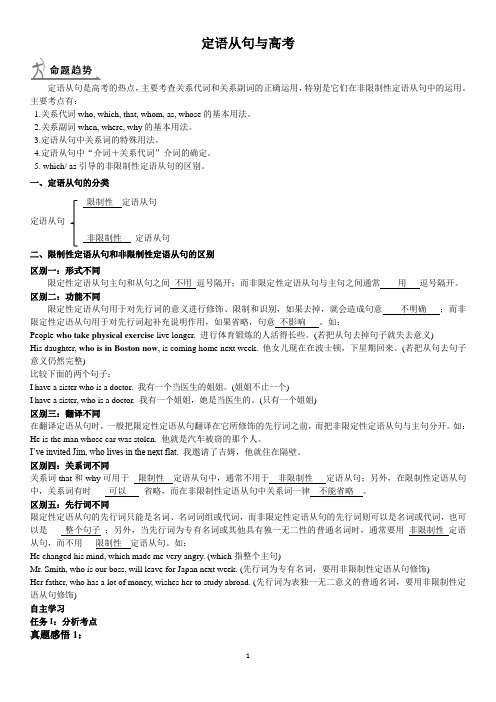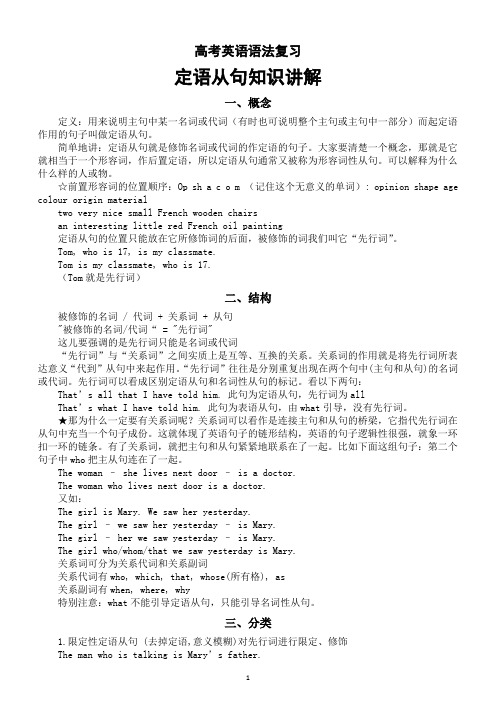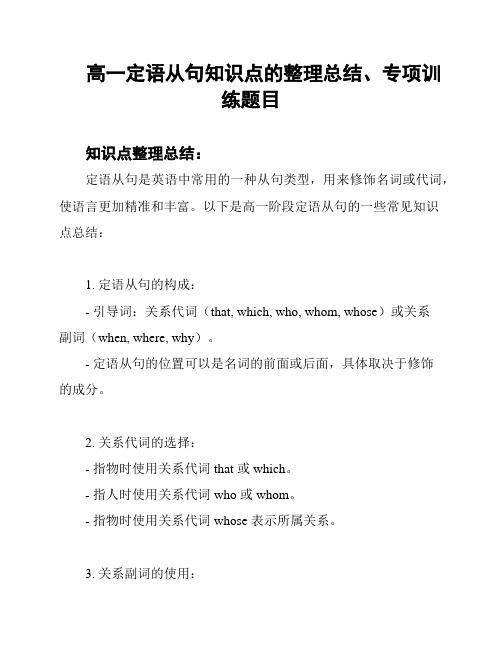高中英语语法基础 ——定语从句知识点总结归纳讲解(附同步练习)(有答案)
完整版)高中英语定语从句讲解及练习

完整版)高中英语定语从句讲解及练习定语从句是高中英语的重点知识,也是高考常考点。
本文将主要讲解关系代词引导的定语从句,并解释关系副词引导的定语从句,包括判断关系代词与关系副词限制性和非限制性定语从句等内容,并提供例题讲解。
定语从句在句中作定语,修饰一个名词或代词,被修饰的名词词组或代词即先行词。
通常出现在先行词之后,由关系词(关系代词或关系副词)引出。
关系代词有:who。
whom。
whose。
that。
which等。
它们代替的先行词是人或物的名词或代词,并在句中充当主语、宾语、定语等成分。
当关系代词在定语从句中作主语时,从句谓语动词的人称和数要和先行词保持一致。
例如,当先行词是人时,可以使用who或whom作为关系代词。
如:Is he the man who/that wants to see you?(他就是你想见的人吗?)关系代词在从句中作主语。
而当先行词是物时,可以使用which或that作为关系代词。
如:The package(which / that)you are carrying is about to come unwrapped.(你拿的包快散了。
)关系代词在从句中作宾语。
除了who。
whom。
whose。
that。
which,还有关系副词when。
where。
why等。
关系副词引导的定语从句也可以修饰一个名词或代词。
例如:I still remember the day when we met.(我仍然记得我们相遇的那一天。
)关系副词when在从句中作时间状语,修饰先行词day。
总之,掌握定语从句的用法和关系词的选择是英语研究的重要内容。
通过不断的练和实践,相信大家可以掌握这一技能。
关系副词可以代替时间、地点或理由的名词,在从句中作状语。
例如,关系副词when。
where。
why的含义相当于“介词+ which”结构,因此常常和“介词+ which”结构交替使用。
比如,有时候我们必须屈服,这是任何人都会遇到的情况(There are ns when [on which] one must yield)。
高考英语语法定语从句讲解与练习附答案

定语从句与高考定语从句是高考的热点,主要考查关系代词和关系副词的正确运用,特别是它们在非限制性定语从句中的运用。
主要考点有:1.关系代词who, which, that, whom, as, whose的基本用法。
2.关系副词when, where, why的基本用法。
3.定语从句中关系词的特殊用法。
4.定语从句中“介词+关系代词”介词的确定。
5. which/ as引导的非限制性定语从句的区别。
一、定语从句的分类限制性定语从句定语从句非限制性定语从句二、限制性定语从句和非限制性定语从句的区别区别一:形式不同限定性定语从句主句和从句之间不用逗号隔开;而非限定性定语从句与主句之间通常____用___逗号隔开。
区别二:功能不同限定性定语从句用于对先行词的意义进行修饰、限制和识别,如果去掉,就会造成句意____不明确___;而非限定性定语从句用于对先行词起补充说明作用,如果省略,句意不影响。
如:People who take physical exercise live longer. 进行体育锻炼的人活得长些。
(若把从句去掉句子就失去意义)His daughter, who is in Boston now, is coming home next week. 他女儿现在在波士顿,下星期回来。
(若把从句去句子意义仍然完整)比较下面的两个句子:I have a sister who is a doctor. 我有一个当医生的姐姐。
(姐姐不止一个)I have a sister, who is a doctor. 我有一个姐姐,她是当医生的。
(只有一个姐姐)区别三:翻译不同在翻译定语从句时,一般把限定性定语从句翻译在它所修饰的先行词之前,而把非限定性定语从句与主句分开。
如:He is the man whose car was stolen. 他就是汽车被窃的那个人。
I’ve invited Jim, who lives in the next flat. 我邀请了吉姆,他就住在隔壁。
高中英语2024届高考语法复习定语从句知识讲解(共十一个方面)

高考英语语法复习定语从句知识讲解一、概念定义:用来说明主句中某一名词或代词(有时也可说明整个主句或主句中一部分)而起定语作用的句子叫做定语从句。
简单地讲:定语从句就是修饰名词或代词的作定语的句子。
大家要清楚一个概念,那就是它就相当于一个形容词,作后置定语,所以定语从句通常又被称为形容词性从句。
可以解释为什么什么样的人或物。
☆前置形容词的位置顺序:Op sh a c o m (记住这个无意义的单词): opinion shape age colour origin materialtwo very nice small French wooden chairsan interesting little red French oil painting定语从句的位置只能放在它所修饰词的后面,被修饰的词我们叫它“先行词”。
Tom, who is 17, is my classmate.Tom is my classmate, who is 17.(Tom就是先行词)二、结构被修饰的名词 / 代词 + 关系词 + 从句"被修饰的名词/代词“ = "先行词"这儿要强调的是先行词只能是名词或代词“先行词”与“关系词”之间实质上是互等、互换的关系。
关系词的作用就是将先行词所表达意义“代到”从句中来起作用。
“先行词”往往是分别重复出现在两个句中(主句和从句)的名词或代词。
先行词可以看成区别定语从句和名词性从句的标记。
看以下两句:That’s all that I have told him. 此句为定语从句,先行词为allThat’s what I have told him. 此句为表语从句,由what引导,没有先行词。
★那为什么一定要有关系词呢?关系词可以看作是连接主句和从句的桥梁,它指代先行词在从句中充当一个句子成份。
这就体现了英语句子的链形结构,英语的句子逻辑性很强,就象一环扣一环的链条。
定语从句语法归纳

高一定语从句语法归纳及练习一、语法知识归纳一、基本概念(一)定语从句在复合句中作定语,修饰名词或代词的从句叫定语从句。
(二)先行词被定语从句所修饰的名词或代词。
一般情况下,定语从句紧跟先行词。
但也有因各种原因定语从句与先行词被分割的现象。
(三)关系代词和关系副词定语从句的引导词。
与先行词关系密切,因此紧跟先行词,并在定语从句中充当一个成分。
关系代词有:who, whom, which, that和whose, 另外,as也可充当关系代词。
关系代词在定语从句中充当主语、宾语、表语和定语。
关系副词有:when, where和why。
在定语从句中充当状语。
二、关系代词的用法(一)基本用法根据先行词的不同,和在从句中所充当的成分不同,选用不同的关系代词。
例如:(注意关系代词在定语从句中所充当的成分)①Do you know the professor who/that will give us a speech next week? (作主语)②I read a report about his new novel that/ which will soon be published. (作主语)③The plan that/which they argued about was settled at last. (作宾语)④This is the new secretary (who/whom/that)I would like to introduce to you. (作宾语)⑤The soldier whose legs were badly wounded was operated on without delay. (作定语)注意:关系代词在定语从句中充当宾语时可以省略,充当主语时则不能。
(见上例③④)(二)关系代词that代替which的一些情况which, that 在代替物时,一般可以通用。
高中定语从句讲解与练习(附答案)

高中定语从句讲解与练习(附答案)定语从句专项讲解与练习1、定语从句在句中修饰某个名词或代词,被定语从句修饰的词叫先行词。
定语从句需用下列关联词:关系代词和关系副词。
它们起连词作用,本身做从句的主语、宾语、表语或定语,本身在从句中作时间、地点或原因状语。
主要有who, whom, that, whose, which, as, when, where, why。
PS:what不能引导定语从句. 指人的关系代词有who、whose、whom、that. 指物的关系代词有which、whose(=of which)、that.The old man who/whom /that we visited yesterday is a famous artist.Miss Wang is taking care of the child whose parents have gone to Beijing .The man with whom my father shook hands just now is our headmaster. (=The man who/whom/ that my father shook hands with just now is our headmaster.)I like the books which / that were written by Lu Xun.The desks (which/that) we made last year were very good.This is the house in which we lived last year. (= This is the house which /that we lived in last year.)I live in the room whose windows face south. (= I live in the room ,the windows of which face south.)2、掌握以上关系代词、关系副词的含义及使用时,要特别注意以下几点:1)指人时宜用who 的情况:a. 当先行词是one, ones, anyone 或those , these 时,关系代词用who。
高考英语定语从句讲解+习题-

在复合句中充当定语的从句叫定语从句。
定语从句的作用相当于形容词,用来修饰主句中的某一名词或代词或整个主句,所以,也称作形容词性从句。
被定语从句修饰的词叫先行词,定语从句一般紧跟在它所修饰的先行词之后。
在先行词和定语从句之间起连接作用的词叫关系词。
关系词有关系代词和关系副词两种。
提示:关系词在定语从句中有三大作用1. 连接作用——连接先行词和定语从句。
I I . 我把我所有的钱都给了她。
(连接先特词和定语从句I )2. 替代作用——在定语从句中替代从句所修饰的先行词。
a . 住在隔壁的那个人是个名师。
(替代)3. 成分作用——在定语从句中作主语、宾语、定语或状语。
I . 我喜欢传统的中国画。
(在定语从句中作主语)一、关系代词引导的定语从句引导定语从句的关系代词主要有, , , , 等。
它们分别代替前面的先行词,并在定语从句中作主语、宾语或定语。
A.指人,在定语从句中作主语。
借钱给你的那人叫什么名字?(定语从句修饰先行词). 谁笑到最后谁笑得最好。
(定语从句修饰先行词)会议主席坐在我右边,他先发言。
(定语从句修饰先行词)B.指人,在定语从句中做宾语。
在口语或非正式文体中,可省略或可用来代替,但在介词后面以与在非限制性定语从句中只能用。
有些人我们是喜欢的,有些人则是我们讨厌的。
(定语从句分别修饰先行词, )I .和我一起工作的人都很友好。
(定语从句修饰先行词). , I , .. , I , .昨晚我在里和卡特先生交谈过,他对我们的计划很感兴趣。
(非限制性定语从句中不能用代替), I , .两个人来到我的办公室,我以前从未见过他们。
(在介词后面不用)C.人、物皆可,做定语,后面要紧跟被修饰的名词,先行词和后面的名词之间往往是从属关系。
有些人,他们的脸你永远难以忘怀。
(定语从句修饰先行词)I .我看见一些树的树叶由于空气污染而发黑。
(定语从句修饰行词)D.1.指物,在定语从句中做主语或宾语。
做宾语时常可省略。
高一定语从句知识点的整理总结、专项训练题目

高一定语从句知识点的整理总结、专项训练题目知识点整理总结:定语从句是英语中常用的一种从句类型,用来修饰名词或代词,使语言更加精准和丰富。
以下是高一阶段定语从句的一些常见知识点总结:1. 定语从句的构成:- 引导词:关系代词(that, which, who, whom, whose)或关系副词(when, where, why)。
- 定语从句的位置可以是名词的前面或后面,具体取决于修饰的成分。
2. 关系代词的选择:- 指物时使用关系代词 that 或 which。
- 指人时使用关系代词 who 或 whom。
- 指物时使用关系代词 whose 表示所属关系。
3. 关系副词的使用:- where 表示地点。
- when 表示时间。
- why 表示原因。
4. 定语从句的省略:- 当关系代词在定语从句中作宾语且不作介词宾语时,可以省略。
5. 定语从句的限制性和非限制性:- 限制性定语从句对所修饰的名词起限定作用,不可省略。
- 非限制性定语从句对所修饰的名词作补充说明,用逗号隔开,一般可省略。
专项训练题目:1. 下列句子中有定语从句的是:- A. The book on the table is mine.- B. This is the pen that I lost yesterday.- D. The boy is tall.2. 选择正确的关系代词填空:- The house _______ you bought is very beautiful.- A. where- B. that- C. who3. 选择正确的关系副词填空:- Do you remember the day ______ we went to the beach? - A. when- B. who- C. why4. 下列句子中哪个是限制性定语从句:- A. My brother, who is a doctor, lives in Paris.- B. The dog that I adopted is very friendly.- C. The house, where we spent our vacation, is now on sale.5. 填入合适的关系代词或关系副词:- This is the bus _______ I often take to work.- A. who- B. when- C. that作答:1. B2. B3. A4. B5. C以上是高一定语从句知识点的整理总结和专项训练题目。
定语从句(关系副词when)知识点综合讲解及其习题专练(附答案)汇总(完整版)

定语从句(关系副词when)知识点综合讲解及其习题专练(附答案)汇总(完整版)一.定语从句(关系副词)知识点:(一)定义:1.在复合句中,修饰名词或代词的句子;2.被修饰的名词或代词叫做先行词;3.引导定语从句的词叫关系词,关系词分为关系代词和关系副词;4.定语从句相当于形容词的用法。
(二)关系副词:1.作用:引导定语从句,指代先行词并且在从句中作成分,关系副词只能作状语。
2.分类:(1) when,在定语从句中作时间状语;(2) where,在定语从句中作地点状语;(3) why,在定语从句中作原因状语;(4) that,在定语从句中可作时间,地点,原因或方式状语。
3.关系副词可以转换为相应的“介词+ which”的结构,介词与先行词有关,来源于固定搭配,句意理解或是语法知识。
(三)when引导的定语从句:1.when引导的定语从句修饰表示时间的先行词,并在从句中作时间状语。
2.时间介词:in / on / at / after / before / for / since / during…(1)in +“超过一天的时间词(month / season / year / century等)”e.g. in 2008 在2008年in spring / summer / autumn (fall)/ winter在春季/秋季/秋季/冬季in April / October 在四月/十月in the 21st century 在二十一世纪(2)on +“具体到某一天的时间词(day / date等)”e.g. on Monday / Sunday 在星期一/在星期天on the National Day 在国庆节on Sunday morning / afternoon / evening在星期天早上/下午/晚上on September 1st在九月一号(3)at +“表几点几分的时间词(hour / minute等)”e.g. at six thirty在6:30at seven 在7:00(4)特殊用法(固定搭配):e.g. in the morning / afternoon / evening在早上/下午/晚上at night / noon / dawn / dusk在晚上/正午/黎明/黄昏(5)after,意为“在……之后”。
- 1、下载文档前请自行甄别文档内容的完整性,平台不提供额外的编辑、内容补充、找答案等附加服务。
- 2、"仅部分预览"的文档,不可在线预览部分如存在完整性等问题,可反馈申请退款(可完整预览的文档不适用该条件!)。
- 3、如文档侵犯您的权益,请联系客服反馈,我们会尽快为您处理(人工客服工作时间:9:00-18:30)。
高中英语语法基础——定语从句知识点归纳讲解(附同步练习)★先行词:被定语从句修饰的名词或代词叫先行词。
通常情况下,引导词前面的名词即为从句的先行词。
★关系词:引导定语从句的词叫关系词。
也可以称作引导词。
①关系代词:who,whom,which,that,whose,as,在从句内作主语、宾语等名词性成分。
②关系副词:when,where,why在从句内作状语。
(一). 使用who、whom、which、that的定语从句1. whoThis is the boy who plays basketball very well.This is the teacher who is teaching us English.▲who 指人, 在从句中作主语。
2. whomThis is the boy (whom) I often help.The man is our headmaster (whom) you met just now.I met the girl (whom) you often praise.▲whom 指人,在从句中作宾语, 可省略。
3. whichThis is the farm which keeps many cows.This is the farm (which ) I visit every year.▲which 指事物, 在从句中作主语或宾语,作宾语时可省略。
4. that以上三种情况均可用that。
指人或指物,可作主语和宾语,作宾语时可省略。
(二). 使用whose的定语从句Do you know the girl whose father is mayor.I used to work in an office whose window faces north.I work in a school whose students are excellent.▲whose 指人或物的所属关系,表示“某人的”或“某物的”。
whose在从句中做定语。
(三). 只能用that 引导定语从句的情况(1)先行词为不定代词all, everything, nothing, something, anything, little, muchI will do all (that) I can to help you.Parents try to offer everything (that) children need.There is not much (that) I can do here.(2) 先行词被序数词或最高级修饰时。
This is the first English novel (that) I have ever read.This is the last lesson (that) I will give you.This is the best film (that) I have ever seen.(3) 先行词被the only, the very 修饰时。
This is the only thing (that) I can do for you.This is the very book (that) I am looking for.(4) 人和物同时作先行词时。
We talked about the things and people (that) we saw in the foreign country.(5) 避免重复:who / which 开头的疑问句。
Who is the man that is standing over there?Which is the book (that) you want to borrow?(6) 当引导词在定语从句中作表语时,引导词也可省略。
He is no longer the man (that) he was. = He is no longer what he was. (表语从句)(四). 使用“介词+ which”和“介词+ whom”的定语从句This is the village in which / where I was born.Physics is a subject in which I am very interested.This is the man with whom I am working.I have many friends, most of whom are businessmen.I have two sisters, both of whom live in the countryside.区分:This is the garden which I am looking after.▲look after, take care of, look for等固定词组,介词不可分开。
(五). 使用where, when, why 的定语从句1. whereThis is the village where I was born.区分:①This is the village which has many green houses.This is the shop where I buy bread.②This is the shop which sells bread.This is the school where I am working.③This is the school which has many good teachers and students.▲where指地点,代替表示地点的介词短语(介词+先行词),在从句中作状语。
which 指事物,在从句中做主语/ 宾语,不做状语。
▲ 当point,situation,conditions等词作先行词表抽象的地点,其后常由where引导Can you think out a situation___this word can be used?Her illness has developed to the point___nobody can cure her.2. whenI’ll never forget the days when we studied together.区分:I’ll never forget the days (which) we spent together.We are living in an age when many things are done on computer.We are living in an age which is seeing great changes.▲when 指时间,代替表示时间的介词短语(介词+先行词),在从句中作状语。
which, 指时间,在从句中做主语/宾语,不做状语。
3. whyHe told me the reason why he didn’t come to school.区分:The reason (which) he gave us is not true.▲why 指原因,代替for the reason, 在从句中作状语。
which 指原因, 在从句中做主语/宾语, 不做状语。
例题:1) They will have to put off his concert until next month, _____ he finishes his travel around the world.(when = next month;在从句中作状语)2) Anyway, that evening, _______ I’ll tell you more about later, I ended up staying at Rachel’s place.(which = that evening;在从句中作宾语)3) Life is like a long race ______ we compete with others to go beyond ourselves.(where = in the race;在从句中作状语)4) Because of the financial crisis, days are gone ____ local 5-star hotels charged 6,000 yuan for one night. (when = during the days;在从句中作状语)5) The reason _____ he rejected our plan is that he had no faith in us.(why = for the reason;在从句中作状语)6) The professor listed a number of cases _____ people shouldn’t talk to strangers.(where = in the cases;在从句中作状语)7) I have reached a point in my life ____ I am supposed to make decisions of my own.(where = at the point;在从句中作状语)8) It’s helpful to put children in a situation ____ they can see themselves differently.(where = in the situation;在从句中作状语)9) Later in this chapter cases will be introduced to readers _____ consumers’ complaints have resulted in changes in the law. (where = in the cases;在从句中作状语)(六). way 做先行词,用in which / that 引导定从, 或省略,引导词在从句中作状语。
1) I like the way ( in which / that ) you talk.2) I don’t like the way ( in which / that ) she whispers in others’ ears.区分:We must learn to act in ways ______do not harm other living things. (that;作主语)(一)非限制性定语从句,先行词后有逗号。
